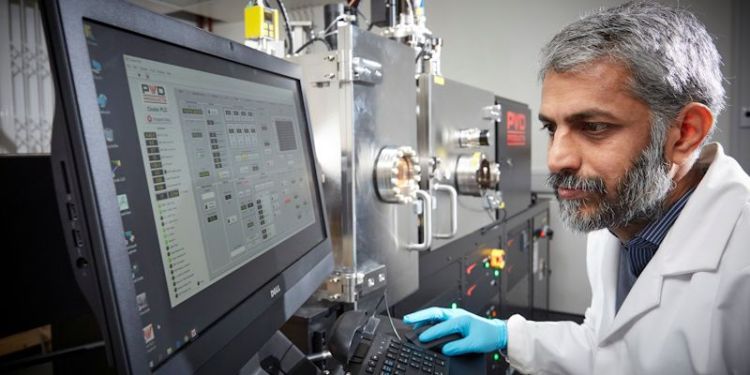
Jayakrishnan Chandrappan
- Course: Chemical and Process Engineering PhD
- PhD title: Femtosecond laser plasma assisted rare-earth doping in silica for integrated optics
- Year of graduation: 2016
- Job title: Head of Packaging
- Company: Compound Semiconductor Applications (CSA) Catapult
- LinkedIn: https://www.linkedin.com/in/jayakrishnan-chandrappan-405426a8/
Now Head of Packaging at CSA Catapult, Jayakrishnan Chandrappan is a School of Chemical and Process Engineering alumni. Exceptionally, he completed his PhD in just two years – the minimum period of study – which is an outstanding achievement. During his postgraduate studies, Jayakrishnan won multiple awards, including a prestigious competition organised by the Royal Society of Chemistry.
Funding a PhD in Chemical and Process Engineering
Jayakrishnan joined for a PhD with a University of Leeds scholarship and then secured the impressive Marie Skłodowska-Curie Individual Fellowship as an experienced researcher during his first year of study.
“The fellowship is highly competitive,” said Jayakrishnan. “It aims to enhance the creative and innovative potential of experienced researchers wishing to diversify their competence and skills by taking a multidisciplinary approach. It is delivered through advanced training, and enables both international and intersectoral mobility.
“The fellowship supported a project entitled ‘Mid-Infra-Red Integrated Photonic Sensor for Health and Environment (MIRIPSHE),’ which involved developing advanced silicon compound sensor technology for monitoring health and the environment.”
Jayakrishnan added: “The support of my supervisor, Professor Gin Jose, was crucial in preparing and submitting my proposal and securing the prestigious Marie Skłodowska-Curie Individual Fellowship, funded by EU Horizon 2020. The accolade acknowledged my talent globally.”
Leading technological developments at CSA Catapult
Jayakrishnan decided to study a PhD at the University of Leeds after one and half decades of international experience in the industry and industrial research. Following his PhD, Jayakrishnan continued his career in industrial research and built on his repertoire of knowledge. This led to him becoming Head of Packaging at CSA Catapult, where he is responsible for the planning and execution of advanced packaging technology development that is central for realising the next-generation compound semiconductor devices and systems.
He said: “In my role at CSA Catapult I am at the forefront of innovation by leading a team of interdisciplinary engineers to develop package interconnect and integration technologies. These technologies are for high frequency, high speed, and high power applications for devices and systems used in communication and sensing, industrial, automotive, and aerospace sectors. This challenging role also allows me to work closely on collaborative research with leading industry partners for accelerating the adoption of compound semiconductor applications.
In my role at CSA Catapult I am at the forefront of innovation by leading a team of interdisciplinary engineers to develop package interconnect and integration technologies.
Jayakrishnan continued: “Soon after university life, I joined Centre for Process Innovation Ltd., a founding member of the UK Government’s High Value Manufacturing Catapult, as a Technology Manager and Principal Scientist. My job role involved in setting up the National Centre for Healthcare Photonics in County Durham, which is for the commercialisation of photonics-enabled healthcare research.”
He added: “I joined my PhD after significant industrial research and industry experience. At that time, I realised a lack of suitable materials are hampering the growth of wide bandwidth IoT. That’s why I decided to study for a PhD at University of Leeds, as it would enable me to engineer novel functional materials for diverse applications.”
Developing new technology through postgraduate research
At the University of Leeds, Jayakrishnan’s studies supported the Applied Photon Science research group in a successful £5.2m EPSRC grant application ‘SeaMatics,’ for the pilot manufacturing of functional materials and is currently a consultant to this project. Professor Gin Jose supervised Jayakrishnan, who explained Professor Jose was very supportive.
Jayakrishnan said: “During my PhD, I developed an ‘Ultrafast Laser Plasma-assisted Doping process’ (ULPD), and accomplished a record high doping of rare-earth elements in-silica, suitable for manufacturing compact ‘optical amplifiers,’ which is a device that amplifies an optical signal without the need to convert it into an electrical signal.
“Professor Gin Jose is a dynamic and encouraging supervisor, who aims to unleash the potential of his students and propel their career to new heights. He helped me to channel my industry experiences into very effective research, which is why I was able to complete the PhD in two years.”
Professor Gin Jose is a dynamic and encouraging supervisor, who aims to unleash the potential of his students and propel their career to new heights.
He added: “It is with Professor Jose’s support that I was able to produce numerous high-quality publications, including Nature’s Scientific Reports papers, a Patent, and the formation of a new start-up company in Leeds: these were some highlights from my research activity during my PhD.”
 Professor Gin Jose in the Integrated Photonics Laboratory
Professor Gin Jose in the Integrated Photonics Laboratory
Award-winning research
Jayakrishnan was selected as one of the top three postgraduate researchers of the year 2015 at the University of Leeds. He was also rewarded by the Royal Society of Chemistry for his academic excellence.
He said: “In 2015, I won the Royal Society of Chemistry's annual Emerging Technologies Showcase competition and I was also selected as one of the top three postgraduate researchers at the University of Leeds.”
He continued: “The Royal Society’s competition accelerates the commercialisation of impactful ideas in healthcare, energy and sustainability, and materials. The event was backed by multinational partner companies such as GlaxoSmithKline, Croda, Procter & Gamble, Pfizer, AstraZeneca, GE Healthcare, Schlumberger and Lubrizol.
“In 2015, the Emerging Technologies Competition was held in London, where 30 finalists from across Europe pitched their ideas to panels of industry experts.”
Collaborations, personal and professional development
After many years of living in Singapore, Jayakrishnan moved to the UK to work and study. Leeds is a charming small city, which has everything needed for students and family fun, he explained. Jayakrishnan was also attracted to Leeds because of its diverse and vibrant mutli-culture. During his studies, he developed personally and professionally because of the location of the University and its resources.
“Collaborations were a significant part of my research,” said Jayakrishnan. During my PhD I had the option to collaborate with a number of universities in the UK, including York, Sheffield, Cambridge, and Glasgow; and in Europe, including the Hungarian Academy of Sciences in Hungary, and HORIBA Scientific in France. This gave me good exposure and connections to experts in my domain.
During my PhD I had the option to collaborate with a number of universities in the UK... which gave me good exposure and connections to experts in my domain.
“The University provided me with the right kind of training as and when needed it. I was able to participate in competitions, and undertake presentation training, which included mock presentation trials. Both technical collaborations, group events – such as researcher training and fun activities – enhanced my experience of the University’s postgraduate community.”
Jayakrishnan added: “Leeds changed my profile, radically promoting both personal and professional development, and enabled me to expand my international outlook.”

